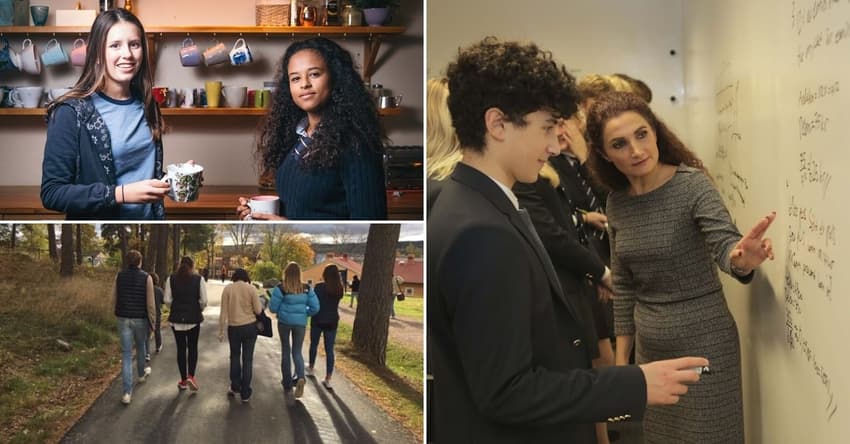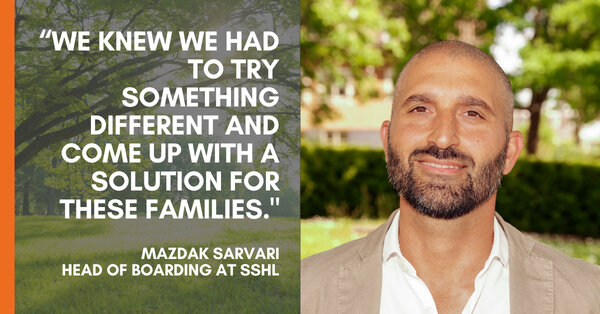How this Swedish school is trailblazing flexible boarding
In 2020, both family life and school life have been hugely disrupted. While everyone has faced difficulties, many international families have had even more challenges to staying connected.

In Sweden, the strength of the state education system means families may struggle to find the kind of flexible schooling options available in many other countries. Now, however, Sigtunaskolan Humanistiska Läroverket (SSHL), a bilingual school in a beautiful forest setting just north of Stockholm, is aiming to change that. The school offers a range of boarding options – and next year it launches weekly boarding, which a number of families are already testing.
Quality schooling and time for family – find out more about SSHL’s different boarding options
Best of both worlds
The new option reflects the fact that, in the 21st Century, many busy families value choice when it comes to education. In countries such as the UK, a range of boarding options – and even flexible combinations – are already common. Weekly boarding – which allows children and parents to focus on studies and work during the week and have quality time together at weekends – has been growing in popularity. In Sweden, however, such a concept is very much a novelty.
Anna Vikström Persson is a Swede who moved from Stockholm to London with her family in 2018 after taking a job as chief HR officer at the learning company Pearson.
Her son Adam enrolled at The Swedish School in London and her husband Ola kept one foot in both cities as an independent consultant and entrepreneur.
For Adam’s final school year, Ola planned to spend more time in Stockholm so that Adam, now 18, could go to one of the city’s public schools – until the Covid-19 pandemic hit and the family decided to rethink things.
Adam’s mother says she was initially reluctant to consider boarding but changed her mind after hearing of SSHL’s weekly option.
“It has a reputation as an international school and we thought it would be good to have that sort of international culture,” she says. “Still, I was hesitant to send him to a boarding school, which just aren’t that common in Sweden.
“We were attracted by the weekly boarding opportunity because he gets the best of both worlds. He lives in Sigtuna during the week, and at the weekend he lives in downtown Stockholm. He can come to visit us here in London, and we can go stay with him there. Being in Stockholm also allows him to see his grandparents as well as other family and friends, so we thought this was perfect for our situation.”
Sign up to receive updates about SSHL's weekly boarding – set to launch in 2021
While the pandemic has meant seeing less of each other than originally planned, the family still meet in person at least once a month, she adds. The school is only a 20- minute drive from Stockholm Arlanda Airport.
A family-focused solution
SSHL dates back more than a century and includes former Swedish Prime Minister Olof Palme among its alumni. It currently has roughly 700 students in grades 7 through 12 – around 500 day students and 200 students on its current boarding options. This includes full year-round boarders, typically international students with no ties to Sweden beyond the school, and traditional boarders, who spend a set number of weekends at home.
Adam’s family are one of nine currently piloting the weekly boarding option, which will be rolled out in full in autumn 2021. Students go home every Friday, except for five weekends throughout the year when there are team-building and full-family activities planned at the school.
Mazdak Sarvari, SSHL’s head of boarding, said: “A lot of families are looking to give their kids the best opportunity to succeed academically, but don’t necessarily want them to be full boarders.
“We knew we had to try something different and come up with a solution for these families. For the younger students, this is a good way of getting a good education Monday through Friday with a house tutor who can help with their studies.”
For older students like Adam, being a weekly boarder makes it possible to stay close to family and friends from other schools alike.
“Some students have their friends and their network in Stockholm, so this allows them to get a top-notch education during the week and then keep those connections going on the weekend,” Sarvari said.
Home away from home
Another advantage is that weekly boarding offers students extra opportunities for support in their studies, extracurricular activities and sports. Parents can also be reassured that if travel is restricted again due to Covid-19, the weekly boarding students will be able to stay at the school as required.
“The last thing we want to do is close the school, so we’ve done a lot of things to make the school safer while keeping it open,” says Sarvari. "We want this to feel like home."
Adam’s mother appreciates how flexible SSHL has been in terms of Adam’s weekend travel plans – and is delighted by how things are working out overall.
“I was a bit nervous about how this would play out, but so far I can say it has exceeded our expectations,” she said. “He really likes Sigtuna. He likes the activities and the sports and he’s made new friends, so he’s in a really good place and I’m sure he’ll be happy for this experience his entire life.”
What’s more the family remains as close as ever. “We still very much feel like a family unit even though he’s in Stockholm and we’re in London,” she added.
This content was paid for by an advertiser and produced by The Local's Creative Studio.



Join the conversation in our comments section below. Share your own views and experience and if you have a question or suggestion for our journalists then email us at [email protected].
Please keep comments civil, constructive and on topic – and make sure to read our terms of use before getting involved.
Please log in here to leave a comment.